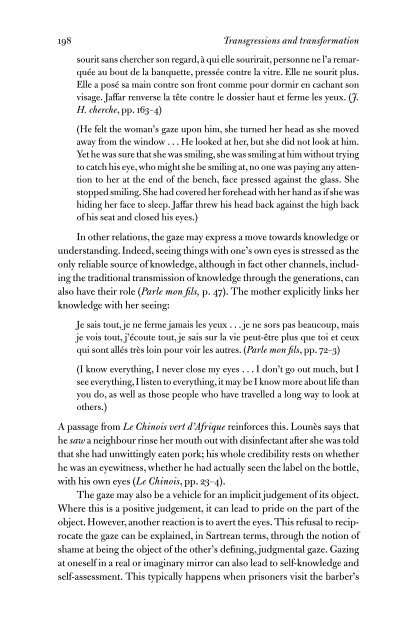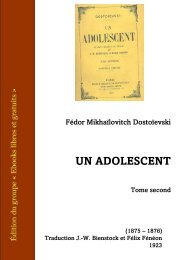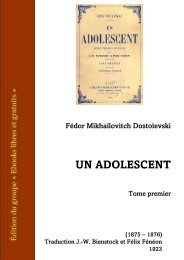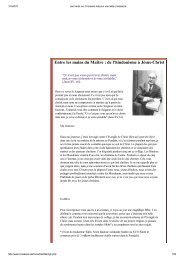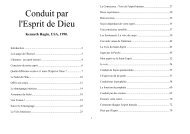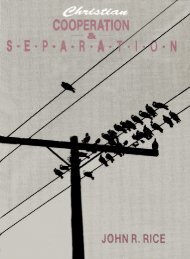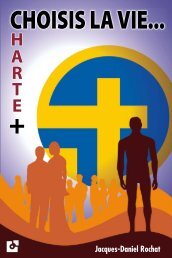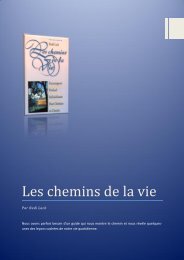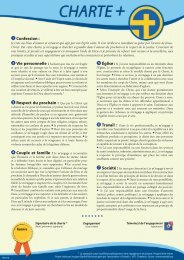Women writing in contemporary France
Create successful ePaper yourself
Turn your PDF publications into a flip-book with our unique Google optimized e-Paper software.
198 Transgressions and transformation<br />
sourit sans chercher son regard, à qui elle sourirait, personne ne l’a remarquée<br />
au bout de la banquette, pressée contre la vitre. Elle ne sourit plus.<br />
Elle a posé sa ma<strong>in</strong> contre son front comme pour dormir en cachant son<br />
visage. Jaffar renverse la tête contre le dossier haut et ferme les yeux. (J.<br />
H. cherche, pp. 163–4)<br />
(He felt the woman’s gaze upon him, she turned her head as she moved<br />
away from the w<strong>in</strong>dow . . . He looked at her, but she did not look at him.<br />
Yet he was sure that she was smil<strong>in</strong>g, she was smil<strong>in</strong>g at him without try<strong>in</strong>g<br />
to catch his eye, who might she be smil<strong>in</strong>g at, no one was pay<strong>in</strong>g any attention<br />
to her at the end of the bench, face pressed aga<strong>in</strong>st the glass. She<br />
stopped smil<strong>in</strong>g. She had covered her forehead with her hand as if she was<br />
hid<strong>in</strong>g her face to sleep. Jaffar threw his head back aga<strong>in</strong>st the high back<br />
of his seat and closed his eyes.)<br />
In other relations, the gaze may express a move towards knowledge or<br />
understand<strong>in</strong>g. Indeed, see<strong>in</strong>g th<strong>in</strong>gs with one’s own eyes is stressed as the<br />
only reliable source of knowledge, although <strong>in</strong> fact other channels, <strong>in</strong>clud<strong>in</strong>g<br />
the traditional transmission of knowledge through the generations, can<br />
also have their role (Parle mon fils, p. 47). The mother explicitly l<strong>in</strong>ks her<br />
knowledge with her see<strong>in</strong>g:<br />
Je sais tout, je ne ferme jamais les yeux . . . je ne sors pas beaucoup, mais<br />
je vois tout, j’écoute tout, je sais sur la vie peut-être plus que toi et ceux<br />
qui sont allés très lo<strong>in</strong> pour voir les autres. (Parle mon fils, pp. 72–3)<br />
(I know everyth<strong>in</strong>g, I never close my eyes . . . I don’t go out much, but I<br />
see everyth<strong>in</strong>g, I listen to everyth<strong>in</strong>g, it may be I know more about life than<br />
you do, as well as those people who have travelled a long way to look at<br />
others.)<br />
A passage from Le Ch<strong>in</strong>ois vert d’Afrique re<strong>in</strong>forces this. Lounès says that<br />
he saw a neighbour r<strong>in</strong>se her mouth out with dis<strong>in</strong>fectant after she was told<br />
that she had unwitt<strong>in</strong>gly eaten pork; his whole credibility rests on whether<br />
he was an eyewitness, whether he had actually seen the label on the bottle,<br />
with his own eyes (Le Ch<strong>in</strong>ois, pp. 23–4).<br />
The gaze may also be a vehicle for an implicit judgement of its object.<br />
Where this is a positive judgement, it can lead to pride on the part of the<br />
object. However, another reaction is to avert the eyes. This refusal to reciprocate<br />
the gaze can be expla<strong>in</strong>ed, <strong>in</strong> Sartrean terms, through the notion of<br />
shame at be<strong>in</strong>g the object of the other’s def<strong>in</strong><strong>in</strong>g, judgmental gaze. Gaz<strong>in</strong>g<br />
at oneself <strong>in</strong> a real or imag<strong>in</strong>ary mirror can also lead to self-knowledge and<br />
self-assessment. This typically happens when prisoners visit the barber’s


